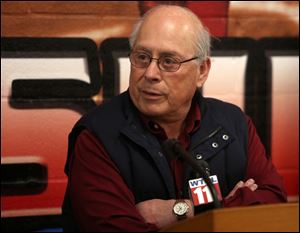
FLOC chief seeks worker safeguards in NAFTA
3/12/2018Throughout his presidential campaign, Donald Trump pledged to renegotiate the North American Free Trade Agreement for the first time since it was implemented in 1994. He followed through on that promise, starting negotiations with Canada and Mexico last August.
Baldemar Velasquez, president of the Toledo-based Farm Labor Organizing Committee, was in Mexico lobbying the country’s leaders to make expanded work protections for Mexicans in the United States as migrant workers a key point in their negotiation strategy.

Baldemar Velasquez is lobbying for expanded protections for migrant workers.
About 200,000 migrant workers come annually to the United States under an H2A visa, and most come from Mexico, Mr. Velasquez said. That visa is specifically for agricultural workers with a job offer in hand. FLOC represents about 10,000 of those workers, and it is advocating for more protections for the entire class of workers that is exempted from a crucial piece of worker-protection law.
“These guys are doing everything legally,” Mr. Velasquez said. “This is about making American businesses honest.”
The Migrant and Seasonal Agricultural Worker Protection Act, which offers workplace conditions standards and other legal protections to workers, does not cover H2A workers. That should be a priority for Mexico, whose citizens are vulnerable in the United States to wage theft, sexual harassment, and dangerous workplace conditions, Mr. Velasquez said.
“These are Mexican citizens,” Mr. Velasquez said. “[The United States] has gone to war with countries over these issues.”
Alan Deardorff, a professor of economics and public policy at the University of Michigan, said the proposal could be beneficial to both the United States and Mexico, since the improved work conditions would keep Mexican workers from being exploited, therefore allowing American workers to compete for jobs without lowering their own labor standards.
“It could be an easy thing for both sides to agree on,” Mr. Deardorff said. Official negotiation objectives from the United States Trade Representative include improving labor standards and bringing the labor rules that exist as side agreements into the full agreement. The only organized opposition to the proposal could be farmers themselves, Mr. Deardorff said.
“A lot of our farmers don’t want to pay more for their labor,” he said.
Joe Cornely, a spokesman for the Ohio Farm Bureau, declined to comment on the proposal.
“Farm Bureau members are actively reminding elected officials that it's extremely important to the food system that we have a stable, legal work force,” he said in a statement. “Our view is that all workers on our farms should be respected and well treated.”
Even if Mr. Velasquez’s push is easy for all sides to support, bringing the agreement together could prove challenging. Mexico is facing a major election in the coming months, and the United States midterms could influence the United States’s ability to agree to a deal.
President Trump has insisted on changes that are strongly opposed by Mexico and Canada, and as power changes hands, a deal becomes harder to close.
“We don’t know what’s going to come of it,” Mr. Deardorff said.
Contact Zack Lemon at zlemon@theblade.com, 419-724-6282 or on Twitter @zack_lemon.